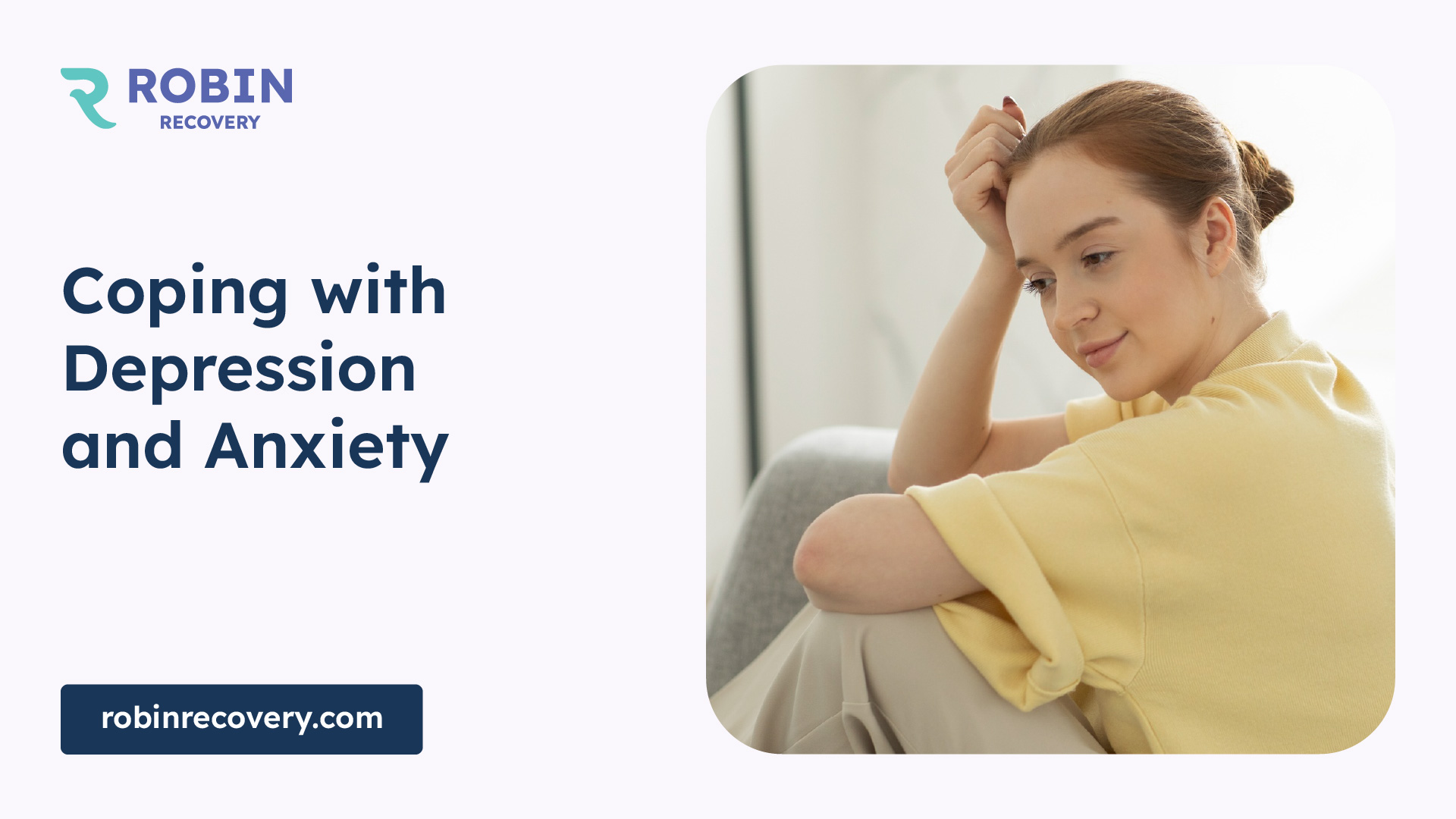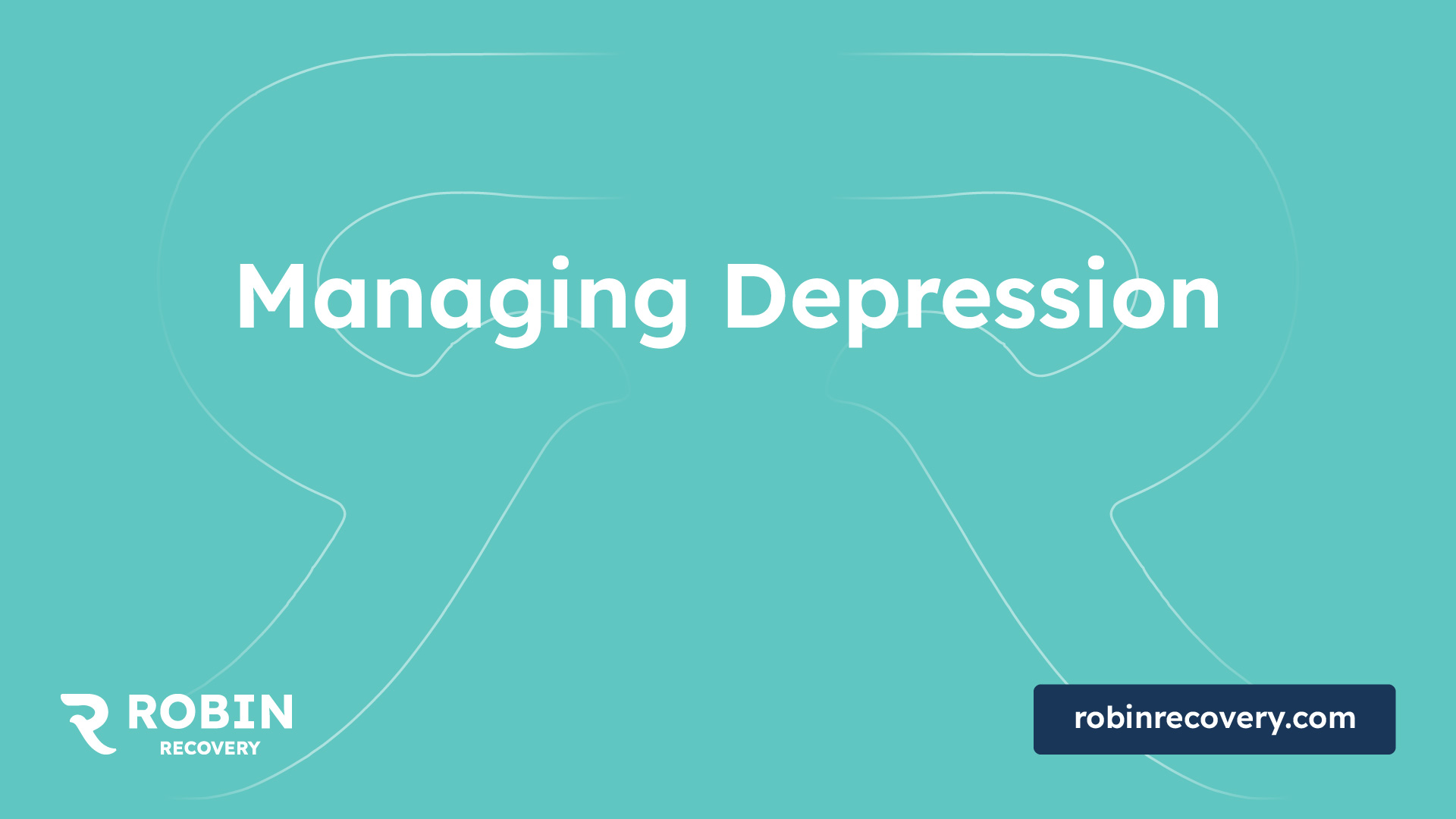Coping with Depression and Anxiety

Understanding Depression
Prevalence and Impact
Depression is a widespread mental health condition affecting millions of individuals. Researchers estimate that nearly 7% of adults in the United States experience depression annually, translating to approximately 16 million adults each year suffering from clinical depression. This means that about one in six individuals will encounter a major depressive episode during their lifetime.
Despite high prevalence rates, many individuals do not seek medical help for their symptoms, resulting in underreported statistics. Depression is often characterized by feelings of sadness, irritability, fatigue, disrupted sleep patterns, and negative thinking, significantly impacting an individual's quality of life [2].
StatisticPrevalenceAdults with depression annuallyApproximately 7%Adults experiencing clinical depressionAbout 16 millionIndividuals experiencing a major depressive episode at some point1 in 6

Diagnosis and Treatment
The diagnosis of depression is determined through clinical evaluation, taking into account the symptoms and their impact on daily functioning. It is essential to recognize that depression is not a sign of weakness and cannot be overcome by willpower alone. It is a medical condition that requires long-term treatment and can lead to significant emotional and physical challenges.
Depression is one of the most treatable mental health conditions, with a success rate of about 80% to 90% for those who pursue treatment. Treatment options may include talk therapy, medication, or a combination of both. Seeking help from professionals, such as those from the Anxiety Disorders Association of America, can provide necessary support for individuals struggling with symptoms of depression and anxiety.
For anyone struggling with depression and anxiety, recognizing the importance of professional guidance can pave the way toward effective management and recovery.
Causes of Depression
Understanding the causes of depression is essential for identifying effective treatment and support options. Depression may arise from a mix of biological, social, and psychological factors.

Factors Contributing to Depression
Depression can be influenced by several overlapping factors which can make it difficult to pinpoint a singular cause. Some of the primary contributors include:
Contributing FactorDescriptionGeneticsFamily history increases riskHormonesFluctuations can trigger symptomsHealth ConditionsChronic illnesses worsen outlookLife EventsTrauma increases vulnerabilitySocial SupportPositive relationships provide strength
Gender and Genetic Influences
Gender plays an important role in the prevalence of depression. Women tend to experience depression at nearly double the rate of men, possibly due to hormonal changes and socialized coping mechanisms. Additionally, genetic factors contribute significantly to an individual's risk of depression, as well as to the severity and response to treatment.
More than just feeling "down," depression is a complex condition that often requires long-term intervention and can lead to major emotional and physical issues. Recognizing these influences can help in understanding the intricacies of those struggling with depression and anxiety, allowing for better coping strategies and treatment options.
For further reading on related issues, explore topics such as self-medicating an anxiety disorder and the relationship between anxiety and addiction.
Managing Depression
Treatment Options
Individuals struggling with depression and anxiety have several treatment options available to them. A combination of therapies tends to yield the best results. These treatments may include psychotherapy, medication, or some combination of both. Depression is one of the most treatable mental health conditions, with approximately 80% to 90% of those who seek help responding well to treatment.
Treatment TypeDescriptionPsychotherapyOften referred to as talk therapy, psychotherapy involves discussing emotions, thoughts, and behaviors with a therapist.MedicationsAntidepressants are used to help manage symptoms. It may take 4–8 weeks to observe effects from medications.Combination TherapyUsing both medication and psychotherapy may be more effective, especially for severe symptoms.

Psychotherapy and Medications
Psychotherapy is an effective treatment for both depression and anxiety. Cognitive Behavioral Therapy (CBT) is one approach frequently utilized, aimed at replacing negative thought patterns with more realistic ones. This therapy helps individuals take specific steps toward recovery.
Medications primarily focus on helping to regulate mood and reduce symptoms. Typically, healthcare providers may prescribe antidepressants, and it may take some time to find the right medication that works for the individual. It is essential to note that people often need to try several different medications before finding the one that suits their needs best [5].
Psychotherapy and medications are commonly used together. For those who experience severe symptoms or limitations in their daily functioning, a combination of both treatments may provide a more effective strategy for managing depression alongside any anxiety-related challenges. Individuals seeking treatment should consult a mental health professional, such as a psychiatrist or psychologist, to determine the best approach for their situation.
For those interested in understanding more about anxiety's connection to depression, further readings can provide insight into how these conditions co-occur and affect treatment approaches.
Co-Occurrence with Anxiety
Understanding the link between anxiety and depression can be crucial for those struggling with depression and anxiety. These two conditions often occur together, and recognizing their relationship is essential for effective management.
Relationship Between Anxiety and Depression
Anxiety and depressive disorders affect more than 40 million adults in the U.S., approximately 18% of the population, every year. About 1 out of every 6 adults will experience depression at some point in their lives. Many individuals with depression also have other mental health conditions, with anxiety disorders frequently co-occurring alongside depression. This combination can lead to intense feelings of anxiety, fear, worry, and panic that interfere with daily activities.
Research indicates that the COVID-19 pandemic has exacerbated mental health issues, resulting in a 27.6% increase in depression and a 25.6% increase in anxiety disorders globally [8]. This highlights the importance of understanding both conditions and addressing them simultaneously for effective treatment.
Treatment Approaches for Both
Effective treatment for individuals experiencing both anxiety and depression typically involves a combination of therapy and, if necessary, medication. Cognitive Behavioral Therapy (CBT) is particularly effective, as it helps replace negative thought patterns with more realistic ones. The following are common treatment approaches:
Treatment TypeDescriptionCognitive Behavioral Therapy (CBT)Focuses on changing negative thought patterns to improve mood and reduce anxiety.MedicationsAntidepressants and anti-anxiety medications may be prescribed to manage symptoms.ExerciseRegular physical activity can improve mood and lessen anxiety, potentially preventing these conditions from returning [9].
Engaging in clinical trials that explore new treatments can also be beneficial as researchers look for better options [5]. It’s essential for individuals dealing with both anxiety and depression to seek help, as early intervention and proper care can significantly improve their quality of life.
Exercise and Mental Health
Benefits of Physical Activity
Engaging in regular physical activity has been shown to create significant mental health benefits. Research indicates that exercise can improve mood and alleviate anxiety, which can be particularly beneficial for individuals who are struggling with depression and anxiety. Not only structured exercise programs, but also everyday activities like gardening, walking, or household chores can help enhance emotional well-being.
The following table summarizes some of the mental health benefits associated with exercise:
BenefitDescriptionMood ImprovementRegular physical activity stimulates the release of endorphins, enhancing mood.Reduced Symptoms of AnxietyExercise helps to lower levels of tension and stress, which can ease anxiety symptoms.Prevention of DepressionConsistent physical activity can help prevent the recurrence of depressive episodes.Boosted Self-EsteemAchieving fitness goals can improve self-confidence and self-worth.
Recommendations for Exercise
To reap the mental health benefits of exercise, the U.S. Department of Health and Human Services recommends the following for most healthy adults:
Type of ExerciseFrequencyExamplesModerate AerobicAt least 150 minutes per weekBrisk walking, cyclingVigorous AerobicAt least 75 minutes per weekRunning, swimmingShort Sessions10 to 15 minutes throughout the dayQuick walks, short workouts
Even small amounts of physical activity can be beneficial. Short sessions of around 10 to 15 minutes can significantly improve symptoms of depression and anxiety. Consistency is important; maintaining a regular exercise routine contributes to sustained mental health benefits. For additional coping strategies, consider exploring self-medicating an anxiety disorder and other resources on managing anxiety.
Seeking Help
Importance of Professional Guidance
For individuals struggling with depression and anxiety, seeking professional help is crucial. According to research, nearly 7% of adults in the United States suffer from depression each year, with over 16% experiencing it at some point in their lives [2]. Treatment options are effective, including lifestyle changes, medication like antidepressants, and therapy, specifically cognitive behavioral therapy.
A mental health professional can assess the severity of symptoms and recommend appropriate interventions. Treatment might include a combination of psychotherapy and medications, especially for those with severe symptoms or functional limitations. In some cases, individuals may require hospitalization or outpatient programs to regain stability and receive necessary support during critical periods [6].
Treatment OptionsDescriptionPsychotherapyIndividual or group therapy tailored to needsMedicationAntidepressants and anxiolytics under supervisionHospitalizationIntensive care for severe cases
Coping Strategies for Anxiety and Depression
While professional help is essential, there are coping strategies individuals can incorporate into their daily lives to manage symptoms of anxiety and depression effectively. These strategies can complement professional treatment and enhance overall well-being.
Coping StrategyDescriptionRegular ExercisePhysical activity can release endorphins, improving mood.Healthy EatingNutritious foods can impact mental health positively.Mindfulness and MeditationPractices that promote relaxation and help manage stress.Social SupportConnecting with friends and family can provide emotional relief.JournalingWriting thoughts and feelings can clarify emotions and reduce anxiety.
Incorporating these strategies into daily routines can help individuals develop resilience and cope better with the challenges posed by anxiety and depression. For more information on the interplay between anxiety and addiction, visit our guide on anxiety and addiction.
References
[2]:
[3]:
[4]:
[5]:
[6]:
[7]:
[8]:
[9]:
